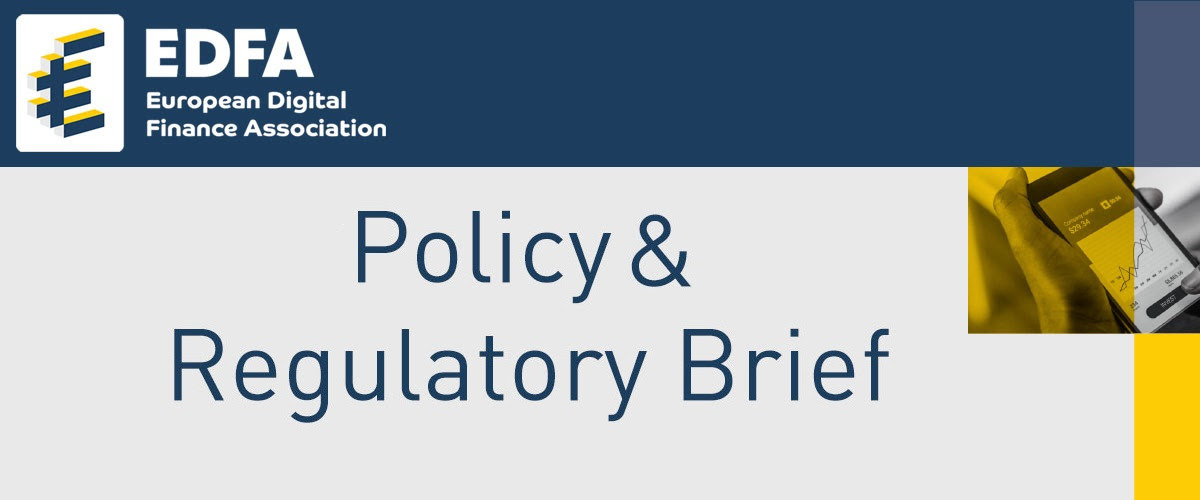European Blockchain Sandbox
Launched in February 2023 the European blockchain sandbox is accepting application from legal entities based in the EEA with a Blockchain/DLT use case with at least 6 months of company activity. Deadline for applications is April 14 at midnight. The sandbox will annually accept cohorts of 20 blockchain use cases. The main support tool is matching with relevant national and EU regulators for a safe and constructive dialogue on the most relevant regulatory issues.
The sandbox is lead by a consortium of Bird & Bird, OXYGY and blockchain experts of WBNoDE.
Directive on Distant Marketing of Financial Services
The Council adopted its position on the revised directive on distance selling of financial services on March 2. The Members States’ position:
- supports the safety net feature: i.e. the directive will apply to both new services not yet covered by specific regulation and to existing products
- allows for fragmentation of the market: member states can maintain existing national rules on pre-contractual information, provided they are more stringent
- extends the right for human intervention to every stage of the negotiation process and contractual relationship
- deletes Commission’s proposal on introducing rules on regulating online interfaces
- enables to provide the pre-contractual information after the conclusion of the contract in case the distant communication tools do not allow for that.
Data Access Compensation
Compensation for data access of third party providers, that is the question of if, how and for what fintech companies will be paying for data, is one of the most important questions to be tackled by the Open Finance Framework.
The European Commission (DG JUST) published a study outlining possible criteria/parameters, which might be used for calculating such ‘reasonable compensation. These parameters, which are merely a discussion material, could include:
- Technical costs such as reproduction costs, dissemination costs, storage costs, anonymization/
pseudonymization costs incurred by the data holder, and costs incurred to protect commercially confidential data - Administrative costs for organising the answer to a sharing request and back-office interactions
- Cost sharing in case of co-generated data.
Currently it seems that majority of incumbents and even some of the “older” fintech players are of the opinion that such access, also by API, by third parties should always be payable. As this would undermine the idea of open data economy and open finance, we invite everyone interested in creating EDFA position to join our open finance working group by contacting maria@europeandigitalfinance.
Digital Identity and Digital Wallet
- stresses that the use of the digital wallet should be voluntary
- requires from Member States to set up at least one wallet with electronic identification system in order to make them interoperable at European level
- states that personal identification data and electronic certificates can be requested, obtained, stored, combined and used “with complete security”.
PSD2 Review Report
- Improve the consistent application of PSD2 across Member States and better align licensing and supervisory rules by setting up (i) a standing committee for coordination between EBA and the NCAs, and (ii) a standing committee among the central banks of the ESCB
- Address competition issues and the position of BigTech by scheduling continued antitrust scrutiny and setting up an information structure on Member State choices on surcharging
- Address legal uncertainty about the scope of PSD2 and the applicable rules by i.a. general definition of “payment service”, which should describe the key features of a payment service compared with other financial services.
- Address legal uncertainty within the PSD2 by i.a. legislative consolidation process between MICA and PSD2
- Unify PSD2 and EMD2 to address legal uncertainty and diverging application of rules across countries and for different market participants
- Address standardisation and interoperability issues, at least when it comes to QR codes, card-payment payment transactions, and API standards as these present a risk of legal fragmentation.
Card-based Payment Markets & IFR
The European Commission is conducting a study on the new developments in card-based payment markets, including as regards relevant aspects of the application of the Interchange Fee Regulation.
EDFA was invited to provide input, therefore interested associations and their members should contactmaria@europeandigitalfinance.


